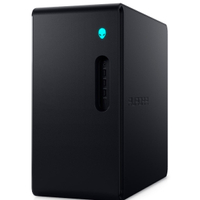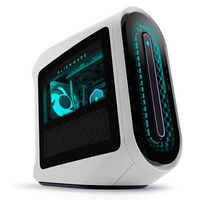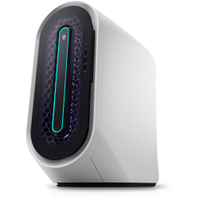Best Alienware gaming PC 2024: Out of this world Aurora builds
Here are the best Alienware gaming PCs and out of this world Aurora builds


The best Alienware gaming PC builds have offers up out of this world performance and style for well for decades, and they still offer more than sci-fi vibes today. While many of you will have fond memories of oddball systems as far back as 2003, Dell has been release cutting-edge Aurora builds on an annual basis since 2009.
As of now, my best Alienware gaming PC pick is the Alienware Aurora R16. The newest version of Dell's Zeta-themed system features a far more subtle design than before, switching out its space pod case for fairly conservative black cuboid. The design appeal more to players than before, but it is admittedly a little bland compared to the company's previous creations. Still, the top model provides a mighty performance punch using an RTX 4090 and 13th gen Intel i9 CPU, helping it ultimately steal the crown.
To help you get in on the Aurora action, we've whipped up a list of the best Alienware rigs available now. Our list covers shiny new Nvidia GeForce RTX 4090 builds, older models, and everything in between, so there's something for all players below. That said, it's worth keeping in mind that Dell likes to discontinue previous versions of its gaming PC line-up once the latest version is out.
The quick list
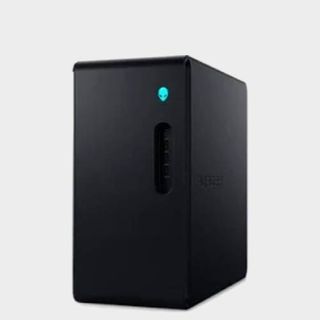
The best Alienware gaming PC overall
The latest Alienware rig is out to impress with its new subtle but stylish case and top-tier PC performance capabilities.
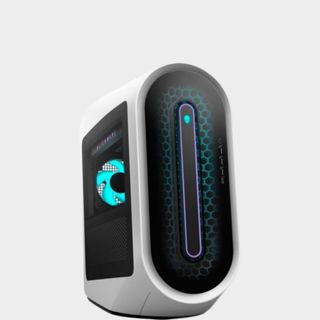
The best Alienware gaming PC
Still an absolute powerhouse in 2024, and will appeal to players looking for a true "Alienware" rig.
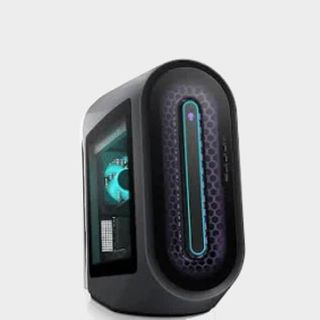
The best budget Alienware gaming PC
If you can find it in stock, the older R13 offers up a great balance between performance and price.

If anyone get's why Alienware PCs are special, it's Phil. Having first tried out their cousin's Aurora ALX rig back in 2006, they've watched the brand evolve from a space-age oddity to an out of this world range of powerhouse machines. While a lot has changed since Dell snapped up the original company, they know exactly what separates the stellar systems from the duds.
Recent updates
24 Oct, 2024: The Alienware Aurora R16 is now our top Alienware gaming PC pick, with the Aurora R15 now occupying the "best for most" spot due to its design and potential for deals. In addition to switching our entries, you'll now find a handy glossary down below that breaks down some of Dell's terminology.
The best Alienware gaming PC





Specifications
Reasons to buy
Reasons to avoid
Alienware Aurora R16 | Check at Dell
The newest version of Alienware's rig features a simplified design, but the top end model also comes armed with an RTX 4090 GPU and one of the best Intel CPUs around. You'll pay a pretty penny for that build, but it's also available in various lower spec flavours that'll suit a variety of budgets.
The Aurora R16 is the newest Alienware gaming PC you can buy, and it features a rather down to earth design that's both more subtle and provides better cooling. Dell has removed a lot of the redundant materials from its boutique build in the name of optimisation, but the innards of this system are still unmistakeably Alienware.
✅ You want something fairly conventional: The Aurora R16 almost looks like a regular gaming PC, featuring a standard shaped case that prioritises airflow and efficient use of space.
✅ You want cutting edge specs: As you'd expect, the newest Alienware model features top-tier specs that are up to 2024 standards, so you won't be missing out on peak performance due to age.
✅ You want top tier 4K performance: At this stage, it's safe to say that Dell's RTX 4090 machines are monstrous, especially compared to older RTX 30-series models.
❌ You want something unique: While not everyone will agree, some of you might be craving that oddball Alienware design that has become synonymous with Dell's gaming rigs.
❌ You prioritize upgradability: Dell's newest rigs still aren't as upgradable as we'd like, so we'd still suggest avoiding these machines if you love to swap out parts frequently.
Design: Dell claims the Aurora R16 runs 7% cooler than its R15 predecessor, and it's 20% quieter to boot. That's going to appeal to anyone worried about high spec gaming thermals, as the new design allows the build's AIO cooler to perform efficiently. Arguably, it also looks better than previous models, featuring a case that looks conventional. That said, if you're an Alienware fan, you're likely not looking for a down to earth system in the first place.
Features: There are a few constants with Aurora gaming rigs, like AIO coolers, custom motherboards, and RGB lighting. That said, the R16 ditches a lot of Dell's usual DNA for a more refined approach, focusing instead on getting the most out of the expensive parts inside than acting like a PC peacock. Now that the company's systems come with DDR5 options and speedy M.2 drives, it feels like Alienware rigs are properly equipped to take on conventional rivals and receive less scrutiny from enthusiasts.
Performance: In testing, the new Aurora provided punchy performance in our benchmark games, hitting higher figures than the R16 in Cyberpunk 2077 specifically. Performance was more than adequate at 4K in the likes of Baldur's Gate 3 too, with averages remaining steady across lengthy gaming sessions. Keep in mind that if you pick up an Nvidia version, you'll also have DLSS at your disposal, enabling you to theoretically double frame rates using AI upscaling and frame generation.
Verdict: I know some of you out there will be disappointed with the Aurora R16's fairly conventional approach to case design. However, when it comes to raw performance and having universal appeal, the new Alien on the ship wins out. With various configurations available and flashy innards throughout the board, Dell has seemingly found a way to make an otherworldly machine without falling folly to over engineering and style over substance.
Read more: Alienware Aurora R16 review
The best Alienware gaming PC for most





Specifications
Reasons to buy
Reasons to avoid
Alienware Aurora R15 | Check at Dell
Dell is in the process of discontinuing the Aurora R15, and it's the perfect opportunity to grab the RTX 4070 Ti version. While the RTX 4090 model featured in our main review naturally packs more a punch, this build currently strikes more of a balance between specs and price.
The Alienware Aurora R15 is a powerhouse pre-build that'll make short work of your Steam library, even at 4K with ultra ray tracing enabled. The rig's lofty specs and curious case design embody the brand's out-of-this-world vibe more so than even the newer Aurora R16, but there are a few caveats to consider when it comes to upgradability.
✅ You want a unique powerhouse: The Aurora R15 might be the last Alienware of its kind, as it still features that iconic capsule case while offering up RTX 4090 performance.
✅ You love RGB lighting: Dell's approach to customizable lighting arguably peaked with the R15, which could be down to its unique design helping colors stand out.
✅ You want to play at 4K: You'll be able to pick from a range of R15 options, and you should have no trouble finding a system that'll run the latest games at 4K.
❌ You prefer conventional design: If you really can't vibe with the R15's unique case, you'd be better off checking out the newer R16 for something more boxy.
❌ You want something customizable: If you're the type of player who likes to completely overhaul your rig every few years, this rig might not be for you due to its custom motherboard.
Design: Dell's Alienware rigs traditionally look a little funky, but the R15 could be the last machine to feature an otherworldly aesthetic. Its space-capsule inspired case isn't going to be everyone's jam, and you certainly won't be able to lazily sit things on top of this beast. However, its RGB lighting and weird shape are iconic and will turn a few heads at LAN events should you lug it to any big multiplayer outings.
While there's nothing stopping you cracking open Dell's capsule PC and tinkering inside, you might find there's little you can actually change. The proprietary motherboard inside only features two DIMM slots, meaning your options are limited when it comes to upgrading RAM. There's also not much space unoccupied within the case, so trying to squeeze different parts inside could be something of a difficult voyage.
Features: Some of the R15's biggest features are tied to its aesthetic, with a custom motherboard and AIO cooler working to provide a unique flair and elevated efficiently. Compared to the R14, Dell says it has increased airflow by 19%, and resulting GPU noise has been reduced by 32%. Not that you want this rig to blend into the background, which explains why it features flamboyant RGB lighting throughout its design that can be customised using AlienFX software.
Performance: We've put the Aurora R15 through our usual benchmarking tests, and it's clear that the rig has awesome capabilities. Supporting up to an Nvidia GeForce RTX 4090, Intel Core i9-13600K CPU, and 32GB DDR5 RAM, we're talking about specs that could rival any machine in the market. The result? Well, the setup can run Cyberpunk 2077 at 147fps at 4K with ultra ray tracing settings enabled, albeit with a helping hand from DLSS 3 AI upscaling.
The Aurora R15 also isn't the quietest system around, but not because it's overly noisy. Its plastic case seems to create strange acoustics that produce an eerie sound, which is perhaps appropriate given its extra territorial design. It also tends to creak a little as internal temperatures rise and fall, which sort of sounds like it's going to transform and take off.
Verdict: The Aurora R15 is the best Alienware gaming PC we've tried to date, and it's got plenty to offer on the performance front. That fact alone might maybe up for its upgradeability pitfalls, as you probably won't need to even think about switching out its core parts for many years to come.
Read more: Alienware Aurora R15 review
The best budget Alienware gaming PC



Specifications
Reasons to buy
Reasons to avoid
Alienware Aurora R13 | Check at Amazon
Specs: Intel Core i9-11900K CPU | Nvidia GeForce RTX 3060 Ti | 16GB DDR5 RAM | 512GB SSD
Typically, you'll pay around $1,400 for the RTX 3060 Ti version of the Aurora R13, and while there are versions out there with an RTX 3070 and above, sticking with this version offers better value for money. That's largely due to the fact the Alienware Aurora R15 is known to pop up with better specs for less than other options, so this is the most we'd recommend paying for an R13 rig in 2024.
The Alienware Aurora R13 isn't the newest Alienware rig, but we still hold it in high regard. Not only did it set the stage for the R14 and R15 in terms of case design and approach, its innards will still make short work of your Steam library without compromise.
✅ You're into space-age aesthetics: There's something undeniably Nasa-punk about Aurora rigs prior to the R16, and the R13 would certainly fit in the backdrop of Starfield.
✅ You need AIO cooling: If you're not looking to spend top dollar on an Alienware but still want water-cooling included, R13 models can do both.
✅ You've got a 1440p monitor: With SKUs covering up to the RTX 3090, you will be able to run many games at 4K, but we'd say it's better suited to maxing out QHD frame rates.
❌ You want an RTX 40 build: The R13 didn't quite manage to board the Nvidia current-gen train, so you'll have to make do with last-gen RTX 30-series GPUs if you got for this model.
❌ You want good airflow: Dell says its newer models are designed to maximise airflow, which could matter to some of you looking to keep temperatures down when running the latest games.
Design: Yes, the older R13 does look almost identical to the newer R15 model, which could be a strong reason to opt for it if one becomes available. Let's be real, many of you out there simply want a rig that'd feel at home in the Alien franchise, and up until the release of the R16, Dell has been following the same design blue print we've come to love. RGB lighting and that unique looking AIO cooler help provide flair from within thanks to the Aurora's glass side panel, so it's just as flashy than some of the latest Alienware builds out there.
Features: In a way, we have the Aurora R13 to thank for the R14 and R15, as it was the first Alienware rig to feature a Cryo-Tech AIO cooler. There are still fan options available, but this machine comes with the benefit of lower temps in even the most demanding gaming scenarios. Intel's 12th gen CPUs can generate a fair amount of heat, so using liquid rather than purely air does help prevent the system's quirky design succumbing to toasty temperatures.
Performance: The main weakness of the Alienware Aurora R13 is the same issue that's plagued many of the systems in our roundup, and that's cooling. Dell has opted for a 120mm AIO water cooler in this machine this time around, and while a marginal improvement given the hardware here, the small-size radiator/pump combo does struggle to cool the demanding components sometimes. It's loud, too. Still, the performance on display certainly speaks for itself, still holding up even in 2024.
If you're able to find an R13 today for the right price, those cooling pitfalls shouldn't deter you from a bargain. Afterall, we're still talking about a high-spec build that comes in RTX 3090 flavors, and while enthusiasts will rightly find reason to grumble about temps, you're still going to be able to boost fps to ridiculous heights compared to an average machine. It perhaps better serves as a 1440p option since it'll serve up frame rates well over 170fps in the likes of Shadow of the Tomb Raider, but it should be able to pull off 4K in many scenarios.
Verdict: Even today, the Alienware Aurora R13 stands as a great gaming PC capable of exceptional QHD results. You'll naturally want to make sure you're paying much less for it than newer models, but it seems to be the system that likes to pop up for less whenever retails come across old stock. It'll no doubt fall off the list eventually as more Aurora models arrive, but we're still holding onto this glorious oddball for now.
- Read more: Alienware Aurora R13 review
Best Alienware gaming PCs - Frequently asked questions
Is Alienware just Dell?
Alienware is a subsidiary of Dell, which means they're a company that is directly owned, and will be influenced by Dell, but they aren't Dell directly. Alienware focuses directly on the gaming PC and gaming laptop market, and a lot of their products tend to take on a lot more flashy design work that isn't typically found in Dell's product ranges.
Is Alienware good for gaming?
Alienware is one of the best gaming PC brands with hardware and software geared specifically around gaming. Programmes such as Alienware Command Centre gives users good control over how their system operates in everything from the fan speeds to the RGB colors, too. In our testing, we've found Alienware machines to work incredibly well depending on their overall configuration.
Is Alienware worth it?
We think that Alienware is worth the price of investment despite the premium price tag these machines usually carry. All Alienware machines that we've had our hands on have been very well built and able to be pushed to their limits. One thing we can tell you, though, is that Alienware PCs do get quite loud and warm under stress, but that's ultimately par the course depending on how high-end you go for.
Why is Alienware so expensive?
Alienware gaming PCs are high end builds, and the parts dwelling within Dell's rigs aren't cheap. You can customise some components if you're on a budget, but you're ultimately going to end up with system armed with the latest Nvidia or AMD graphics card paired with a shiny new CPU.
How much does an Alienware gaming PC cost?
Alienware gaming PCs generally start from around the $1,100 mark depending on what hardware you opt for in your machine. It's entirely possible to find Alienware gaming PC deals all year round, but you can also find deep discounts often, too, with frequent special events.
Best Alienware gaming PC 2024: Minimum specs to look for
When looking for the best Alienware gaming PC, you want the most bang for your buck as possible, especially when Alienware products aren't the cheapest you'll find. You want to make sure that your rig is futureproofed with solid specs, but what are these? We've supplied our minimum spec recommendations for in 2024 down below.
In particular, we'd look to secure an NVMe, Gen 4 M.2 SSD, as we consider these the best SSDs for gaming. As for capacity, don't get your wallet out for anything less than 500GB. Yes, there are some exceptions. If a prebuilt PC comes with a hybrid storage system, so 250GB of SSD combined with 2TB of HDD, maybe it's alright. But ideally, you don't want an SSD in your machine that's less than 500GB.
Elsewhere, look for a 13th Gen Intel Core i9, or AMD Ryzen 5 or 7 processor, as these are often the best CPUs for gaming. 11th Gen, or 5000 series AMD CPUs are the absolute minimum we'd shoot for in the year of our lord 2024. These chips will perform just fine, but they won't be futureproofed going forward. Also worth keeping in mind, is that DDR5 RAM is only compatible with certain motherboards, and by proxy, will only reach its top speeds with a newer generation CPU.

The choice that will impact price the most, is whether or not you get one of the best graphics cards. At this point in time, we'd recommend an RTX 4060 and above, since these are now readily available and much more affordable. If you've got the budget, you'll perhaps want to pick up a build with a shiny new RTX 4090 inside, as that way you'll be able to smash through system requirements for new releases with no compromise. That said, the new Aurora R16 actually caps out at the RTX 4080, so keep that in mind if you're looking for the absolute best Aurora rig in terms of performance.
In terms of memory, we'd look for 16GB of DDR4 as a minimum. If you can get DDR5, then even better, just make sure your motherboard supports it. It's also worth noting that some builds only come with two DIMM slots, meaning there will be limits on how many modules you can use to upgrade.
Lastly, it's important to highlight that there are major design differences between the the Aurora R16 and previous machines, as the latest version features a more traditional shape and refined cooling system. So, if you'd rather opt for something less flashy, picking up the newest model might make all the difference.
How to choose an Alienware gaming PC
Why you can trust GamesRadar+
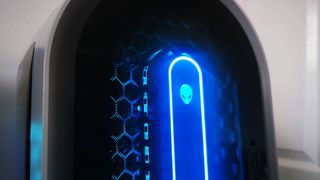
Admittedly, milage can vary in 2024 when it comes to choosing an Alienware gaming PC. That's largely because Dell tends to discontinue its older systems quite quickly, meaning you'll potentially have to go with the latest iteration of its Aurora series. That in turn might lead you down a rabbit hole in terms of sellers and the second hand market, but I'd suggest being very cautious when it comes either of those tactics.
Ideally, you'll want to start by taking note of our minimum specs advice above, as this will save you getting burned paying too much for an older system. There's nothing wrong with using a machine with an older CPU and GPU, but you don't want to be paying anywhere near the same amount as you would for an R15 or R16 rig. You'll also want to avoid paying too much simply just to get your hands on something with an Alienware badge, as while some systems might have been cutting edge when they released, they might not be outflanked by much cheaper options.
Once you've got ideal specs in mind for your needs, I'd strongly advise thinking about formfactor. The new Aurora R16 range are far more conventional in terms of aesthetics than the R15 or older, and that very fact could matter depending on your setup. If you share a living space, the last thing you'll want to do is plank a space capsule down in your contemporary room, whereas those of you looking for something unique will want exactly that.
Ultimately, choosing the right Alienware gaming PC comes down to your own playstyle and preferences. If you're looking for the best rig, you're better off sticking with the latest line of machines and top-of-the-line specs. Otherwise, you'll want to choose based on formfactor, price, and bang for buck.
Glossary: Alienware gaming PC terms explained
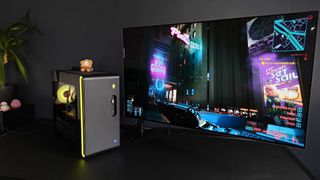
Aurora: The specific brand name given to Dell's newest Alienware gaming PCs. The first model, the Aurora R1, arrive back in 2010, and there has been 16 versions released yearly since then.
AlienFX: The term used to describe the RGB lighting included with both Alienware gaming PCs and laptops. The latest model, the Aurora R15, features what Dell calls a "AlienFX stadium loop" that surrounds the front vent and provides illumination. Customizations can be made via the Command Centre app.
AIO cooler: The liquid cooler used in most mid to high-end Aurora builds that fits straight to the CPU and to either a 120mm or 240mm radiator at the top. Opting for system with liquid cooling will result in lower fan noise and lower temperatures overall.
Cryo-tech: A variant of Alienware's liquid cooling system that features additional RGB illumination and a thicker five-blade radiator.
Dark Side of the Moon: The name given to the black and red colorway included across the Alienware Aurora family. These specific models normally features AMD graphics cards and processors.
Lunar Light: A term used for the white and blue version of Dell's Alienware PCs. The last version to release with this colorway was the Aurora R15 since the newer R16 only comes in matt black.
How we test Alienware gaming PCs at GamesRadar+
Our expert team spends countless hours putting gaming PCs through their paces, and Alienware rigs are no exception. While performance capabilities are at the forefront of our testing, we also closest consider specs, design, features, and price to determine whether a system should make our recommended list.
In a way, gaming PCs are multiple products in one, and our tests involve benchmarking each system's graphics card and CPU in addition to the entire rig. To maintain consistency, we use a set collection of games to collect data on frame rates, temperatures, and general performance, which can be then used to compare against alternatives.
Our a full rundown, check out how we test gaming PCs for more information on our benchmark procedures. Alternatively, take a peek at our hardware policy guide for insight into how we conduct all of our reviews.
You'll also find guides to the best gaming mouse, best gaming keyboard, and best gaming monitor if you're refreshing your whole setup as well.
Sign up to the GamesRadar+ Newsletter
Weekly digests, tales from the communities you love, and more

I’ve been messing around with PCs, video game consoles, and tech since before I could speak. Don’t get me wrong, I kickstarted my relationship with technology by jamming a Hot Wheels double-decker bus into my parent’s VCR, but we all have to start somewhere. I even somehow managed to become a walking, talking buyer’s guide at my teenage supermarket job, which helped me accept my career fate. So, rather than try to realise my musician dreams, or see out my University degree, I started running my own retro pop culture site and writing about video games and tech for the likes of TechRadar, The Daily Star, and the BBC before eventually ending up with a job covering graphics card shenanigans at PCGamesN. Now, I’m your friendly neighbourhood Hardware Editor at GamesRadar, and it’s my job to make sure you can kick butt in all your favourite games using the best gaming hardware, whether you’re a sucker for handhelds like the Steam Deck and Nintendo Switch or a hardcore gaming PC enthusiast.
Most Popular



